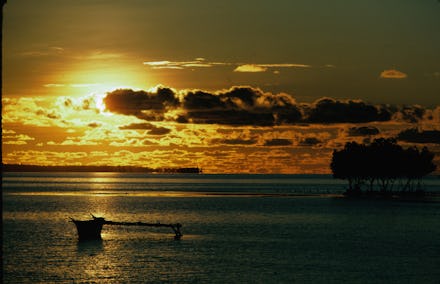An Entire Island Nation Is Preparing to Evacuate Before It Sinks Into the Ocean

The news: The citizens of the island of Kiribati are planning for a worst-case climate change scenario: The Pacific island nation will likely sink underneath the sea in 20 to 85 years.
In a record deal, the country has purchased a 20-square-kilometer chunk of forest on the Fijian island of Vanau Levu for $8.8 million in case it needs to evacuate some of the 103,000 residents due to rising sea levels. Though the islands are separated by over 2,000 kilometers, the people of Kiribati may have no choice but to move if large stretches of their homeland are swallowed by the ocean.
"We would hope not to put everyone on [this] one piece of land, but if it became absolutely necessary, yes, we could do it," Kiribati President Anote Tong told the Associated Press. He added, "It wouldn't be for me, personally, but would apply more to a younger generation. For them, moving won't be a matter of choice. It's basically going to be a matter of survival."
Image Credit: Reuters
Tong claims that Kiribati is facing many climate-related challenges, including increasing salt pollution in its freshwater supplies, changing weather and storm patterns, and a rising ocean. In some places the sea is rising by 1.2 centimeters a year, four times the global average. That number is likely to accelerate and many of Kiribati's coral atolls are just feet above sea level.
Image credit: Getty
The background: Kiribati's population is still growing; some estimates expect the population on Tarawa atoll to double to 103,000 in 17 years. Meanwhile Public Utilities Board director Kevin Rouata told The Global Mail that Tarawa has reached its maximum freshwater capacity without jeopardizing future supplies. The IPCC (Intergovernmental Panel on Climate Change) projects that the water supply of Kiribati's largest city, South Tarawa, could dwindle by as much as 65% in the next 40 years.
Kiribati also cannot afford expensive alternatives like desalinization plants. Tong explains that every person with a cash income on Kiribati supports about six others.
In a documentary from 2011, Tong estimates that his country only has 30-60 years left before it becomes uninhabitable, leading him to pursue initiatives like mass migration. It's not a matter of if, but when; some villages have already been flooded out. Even if emissions were immediately halted, most of Kiribati would still become uininhabitable.
In March, the IPCC published its fifth assessent report, which concluded that many smaller islands in the Pacific and Indian oceans risk being totally or mostly submerged in just the next few decades.
The problem affects more places than just Kiribati. Nations such as Tuvalu and the Marshall Islands are under threat of permanent extinction as well. By 2050, global warming will displace anywhere from 200-700 million people, including communities in Africa facing the effects of desertification.
What's next: Tong is waiting for parliamentary approval of the deal and then has to clear mass relocation with the Fijian authorities. Meanwhile Fiji is facing serious climate change-related problems of its own and earlier this month accused the global community (in particular Australia) of abandoning Pacific islands to doom.
It's really a grim situation. "[They] are already swamping the coastal areas of many Pacific nations, including Fiji," said Fijian Interim Prime Minister Frank Bainimarama at the Pacific Islands Development Forum. "Yet if anything, the collective will of the global community to adequately address this crisis is receding."